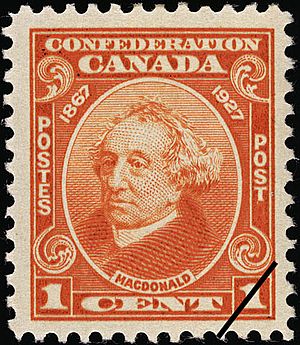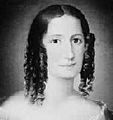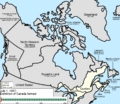John A. Macdonald facts for kids
Quick facts for kids
The Right Honourable
Sir John Alexander Macdonald |
|
|---|---|
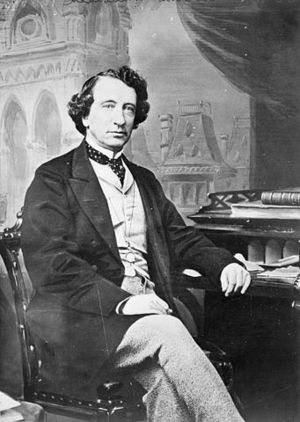
Macdonald in 1868.
(age 53) |
|
| 1st Prime Minister of Canada | |
| In office July 1, 1867 – November 5, 1873 |
|
| Succeeded by | Alexander Mackenzie |
| In office October 17, 1878 – June 6, 1891 |
|
| Preceded by | Alexander Mackenzie |
| Succeeded by | John Abbott |
| Personal details | |
| Born | January 11, 1815 Glasgow, Scotland |
| Died | June 6,1891 Ottawa, Ontario |
| Political party | Conservative |
| Spouses | Isabella Clark (1st wife) Agnes Bernard (2nd wife) |
| Children | John Alexander (died in infancy) and Hugh John by Isabella; Mary by Agnes. |
| Alma mater | none (articled with a lawyer in Kingston) |
| Profession | Lawyer |
| Signature | |
Sir John Alexander Macdonald was Canada's very first Prime Minister. He was born on January 11, 1815, in Glasgow, Scotland. He passed away on June 6, 1891.
Macdonald was a very important person in the creation of Canada. His political career lasted for almost 50 years! He served as Prime Minister from 1867 to 1873, and again from 1878 until he died in 1891.
Contents
Early Life and Moving to Canada
John A. Macdonald had four brothers and sisters. He was the third of five children. When he was a young boy, his family moved from Scotland to Kingston, in what was then called Upper Canada. Today, Kingston is in eastern Ontario.
Macdonald became a lawyer. He worked on many important cases and quickly became well-known in Kingston. In 1844, the people of Kingston elected him to represent them in the government of the Province of Canada. By 1857, he had become a top leader in the colony's government.
Building the Nation: Confederation
In 1864, the government was having trouble. No single political group could stay in power for long. Macdonald agreed to work with his political rival, George Brown. They decided that all the main political groups should work together. This was called the Great Coalition. Their goal was to create a federation and make big changes to the government.
Macdonald was the main leader in these talks. Their hard work led to the British North America Act. This act officially created Canada as a new nation on July 1, 1867. Macdonald became the first Prime Minister of this new country. He served for 19 years in total.
Prime Minister of Canada
Macdonald was Prime Minister from 1867 to 1873. He was then re-elected in 1878 and stayed in office until he died in 1891. This makes him the second longest-serving Prime Minister in Canadian history. He was also the only Prime Minister to win six majority governments.
Macdonald could not speak French as well as later Prime Ministers. However, he could speak Scottish Gaelic and a little bit of Latin.
One of Macdonald's biggest goals was to build a transcontinental railway. This railway would connect Canada from the Atlantic Ocean all the way to the Pacific Ocean. This huge project, called the Canadian Pacific Railway, was finished in 1885.
Macdonald's Legacy
Sir John A. Macdonald's greatest achievements were creating and leading a successful national government. He also completed the Canadian Pacific Railway, which helped unite the country. He died while still in office in 1891.
Today, Macdonald is remembered for his very important role in forming Canada. Many historians rank him as one of the best Prime Ministers in Canadian history.
Memorials and Honours
Macdonald served as Prime Minister for almost 19 years. Only William Lyon Mackenzie King served longer. In surveys, Macdonald is often ranked as one of Canada's greatest Prime Ministers.
- A mountain in the Rocky Mountains, Mount Macdonald, is named after him.
- January 11 is recognized as Sir John A. Macdonald Day.
- His face appeared on Canadian ten-dollar bills between 1971 and 2018.
- In 2015, the Royal Canadian Mint put his face on the Canadian two-dollar coin, the Toonie, to celebrate his 200th birthday.
- Several places are named after him, including Sir John A. Macdonald Parkway in Ottawa and Ottawa Macdonald–Cartier International Airport.
Preserved Sites and Statues
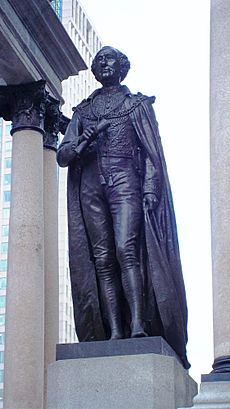
Many places linked to Macdonald have been preserved. His burial site is a National Historic Site of Canada. Bellevue House in Kingston, where his family lived in the 1840s, is also a National Historic Site. His home in Ottawa, Earnscliffe, is now the official residence of the British High Commissioner to Canada.
Statues of Macdonald have been placed across Canada. One stands on Parliament Hill in Ottawa. Another statue was in Kingston's City Park. However, in 2021, this statue was moved to Cataraqui Cemetery where Macdonald is buried. In 2018, a statue of Macdonald was removed from outside Victoria City Hall. This was part of the city's efforts to make peace with local First Nations.
Historical Views and Controversies
Historians recognize Macdonald's important role in creating Canada. However, some of his policies have also faced criticism. For example, some of his decisions affected Indigenous peoples and Chinese workers. These policies have led to discussions and the removal of some statues.
In 2017, the Canadian Historical Association voted to remove Macdonald's name from a history prize. In 2018, an online article about Macdonald was removed from the Scottish government's website. This was because of concerns raised by Indigenous communities about his legacy.
Honorary Degrees
Macdonald received special honorary degrees from universities:
| Location | Date | School | Degree |
|---|---|---|---|
| Canada West | 1863 | Queen's University at Kingston | Doctor of Laws (LL.D) |
| 1865 | University of Oxford | Doctor of Civil Law (D.C.L.) | |
| Ontario | 1889 | University of Toronto | Doctor of Laws (LL.D) |
Images for kids
-
The funeral of Sir John A. Macdonald in Cataraqui Cemetery, Kingston, Ontario.
See also
 In Spanish: John A. Macdonald para niños
In Spanish: John A. Macdonald para niños
 | Audre Lorde |
 | John Berry Meachum |
 | Ferdinand Lee Barnett |


